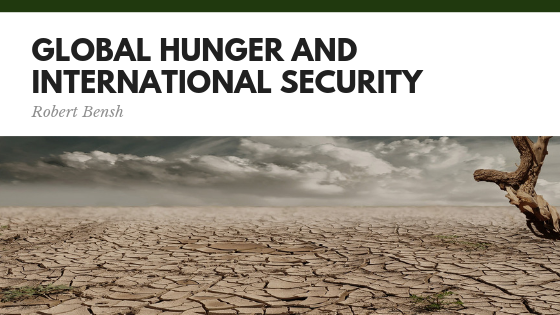Famine is often in the news. These natural disasters may seem far removed and irrelevant, but global hunger is actually intricately connected to international security.
Current Climate
The world is currently facing famine in many countries, including Nigeria, South Sudan, Somalia, and Yemen. Major droughts have left these countries in turmoil. Famines have denied many families who work in agriculture their livelihoods. Crops are harder to come by and prices for good rise. This means that many people have had to go without food. Limited opportunities force people to abandon their homes and move into other areas, hoping to find a source of income and security. When groups of hungry, restless, and desperate people are forced together into smaller spaces, it leads to instability.
Food insecurity is unfortunately continuing to rise. The factors behind this are complicated. They include market disruptions, production problems, problematic government policies, and the mismanagement of resources.
Famines are also becoming increasingly common due to climate change. More areas are susceptible to famine than in years prior.
Instability
Limited resource lead to instability. People who are hungry and lack jobs stop trusting their governments, causing dangerous riots and demonstrations. They may view their leaders as unwilling to provide them with basic services, which sparks insurrections.
Hungry populations are also more susceptible to seeing a rise in terrorist groups. These groups may use food and other resources to bribe recruits to join. The threat of starvation causes people to take desperate measures.
One recent example of this was during the 2011 Arab Spring crisis in Algeria and Tunisia. The skyrocketing prices of necessities such as oil and flour contributed to the revolts. Terrorist groups like Hezbollah and ISIL used food to promote their goals and recruit individuals.
Ripple Effect
Thanks to globalization, the world’s communities are connected like never before. Famine and instability have a far-reaching ripple effect. Countries are connected through trade and resources. Loss of product doesn’t only affect the country looking to export the goods. Other groups that rely on that product suffer.
Terrorism is also not normally limited to one region. Even developed countries are at risk. Terrorists are unpredictable and can prove extremely dangerous if they have the right resources.
Although few consider its implications, global hunger is a very important security issue. Food insecurity is becoming increasingly relevant. Limited resources lead to instability, which can spread to other regions of the world through trade implications and terrorist groups.

